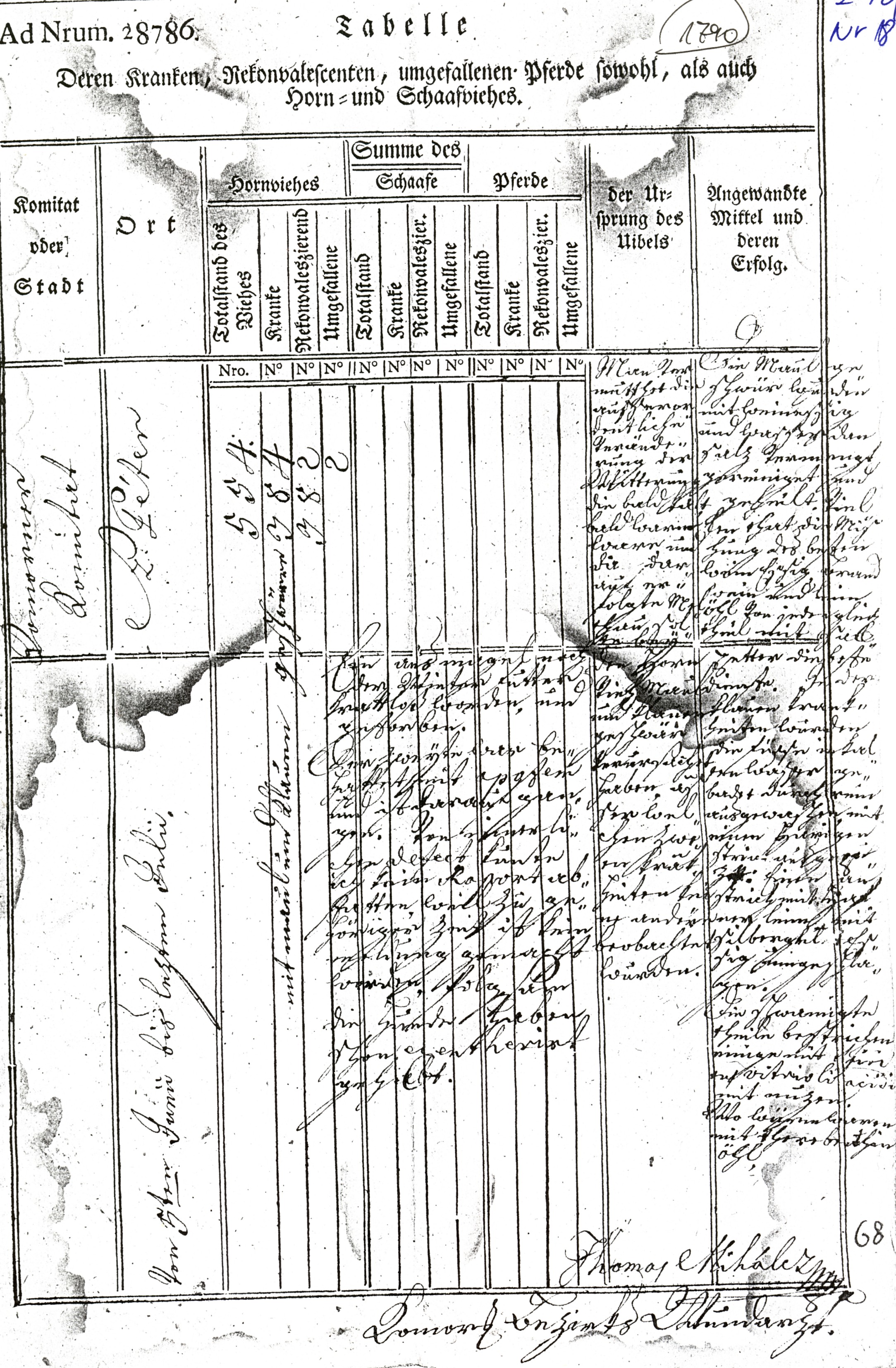Megfigyelni, megnevezni, lejegyezni
A járványos és népbetegségek írásantropológiája a 18. századi Magyar Királyságban
DOI:
https://doi.org/10.15170/PAAA.2022.09.02.04.Kulcsszavak:
18. századi empirikus medicina, endémia, epidémia, adatgyűjtés, egészségügyi adminisztráció, orvosi napló, egészségügyi jelentésírás, írásantropológiaAbsztrakt
A Habsburg kormányzati gyakorlatban az 1750-es évektől bekövetkezett léptékváltás részeként, egyik sikeres gyakorlóterepeként értelmezhetőek az előbb a Monarchia központjában, Bécsben, majd a birodalom központjától távolabb eső részekben is bevezetésre került átfogó egészségügyi reformprogram adminisztratív intézkedései. Ezen törekvések jegyében az egyes törvényhatóságok élén álló főorvosoknak saját működési területükön minden egészségüggyel kapcsolatos jelenségről megbízható adatokat kellett gyűjteniük, s azokat előre megadott szempontok alapján szükséges volt rendszerezniük. A rendszeres, specifikus adatgyűjtés, az adatok különböző, időben változó vizualizációs médiumok (folyó szöveg, kérdőívek, táblázatok) segítségével történő rendszerezése lehetővé tette a központi kormányzat számára az ily módon előállított és rendelkezésre álló információkban rejlő, jellemzően rövid, tényszerű, konkrét, aktuális, szinoptikus tudásanyag birodalmi (Udvari Kancellária, bécsi egyetem orvosi fakultása) és regionális (Helytartótanács, nagyszombati, budai majd pesti egyetem orvosi fakultása) „tudásközpontokban” való felhalmozását, szűrését, értelmezését, az ítéletalkotást és a döntéshozatalt. Tanulmányunkban a módszerként, empirikus megismerési gyakorlatként, minőségbiztosítási „intézményként” és a hálózatképzés eszközeként egyaránt értelmezhető egészségügyi jelentésírásnak a magyarországi működését, összetett funkcióit, a korabeli tudományosságban betöltött szerepét a jelentések részét képező járványos és népbetegségek regisztrálásának példáján keresztül mutatjuk be.
Letöltések
Hivatkozások
Coquery, Natacha: Les écritures boutiquières au XVIIIe siècle: culture, savante, encadrement légal et pratiques marchande. In: Écrire, compter, mesurer. Vers une histoire des rationalités pratiques. Éds. Coquery, Natacha - Menant, François - Weber, Florence. Paris, 2006. 163-180. ǁ [DOI] https://doi.org/10.14375/NP.9782728803729 ǁ [Google Scholar] https://tinyurl.com/mvvt9btf
Daston, Lorraine: Wunder, Beweise und Tatsachen. Zur Geschichte der Rationalität. Frankfurt am Main, 2003. ǁ [Google Scholar] https://tinyurl.com/22cvetj5
Médecins, climat et épidémies à la fin du XVIIIe siècle. Éds. Desaive, Jean-Paul - Goubert, Jean-Pierre - Le Roy Ladurie, Emmanuel - Meyer, Jean - Muller, Otto - Peter, Jean-Pierre. Paris – La Haye, 1972.
Foucault, Michel: A klinikai orvoslás születése. Budapest, 2000.
Geyer-Kordesch, Johanna: Medizinische Fallbeschreibung und ihre Bedeutung in der Wissensreform des 17. und 18. Jahrhunderts. Medizin, Gesellschaft und Geschichte 9. (1990) 7-19. ǁ [Google Scholar] https://tinyurl.com/mtnvyzra
H. Balázs Éva: A francia-magyar kapcsolatok egy rendhagyó fejezete. (A fiziokrata tanok útja Magyarországra). In: „Sorsotok előre nézzétek.” A francia felvilágosodás és a magyar kultúra. Szerk. Köpeczi Béla - Sziklay László. Budapest, 1975. 149-160.
H. Balázs Éva: A nyolcvanas esztendők drámája. In: Magyarország története 1686-1790. IV/2. Szerk. Ember Győző - Heckenast Gusztáv. Budapest, 1989. 1023-1123.
Sammeln als Wissen. Hrsg. Heesen, Anke te - Spary C., Emma. Göttingen, 2001.
Hess, Volker: Von der semiotischen zur diagnostischen Medizin. Die Entstehung der klinischen Methode zwischen 1750 und 1850. Husum, 1993. ǁ [Google Scholar] https://tinyurl.com/mr3jb8rw
Hess, Volker: Vom Miasma zum Virus. In: Pocken zwischen Alltag, Medizin und Politik. Begleitbuch zur Ausstellung. Hrsg. MÜNCH, Ragnhild. Berlin, 1994. 16-30.
Hoorn, Tanja van: Naturgeschichte in der ästhetischen Moderne. Göttingen, 2016.
Jacobi, Karl: Francis Bacon gedoppelte Ontologie. In: Philosophie der Struktur, - „Fahrzeug” der Zukunft? Hrsg. Stenger, Georg - Röhrig, Margarete. Freiburg - München, 1995. 345–367.
Krász Lilla: Orvosok a hivatal szolgálatában a 18. századi Magyarországon. Századok 150. (2016):4. 821-870.
Krász Lilla: „Megfigyelve leírni, leírva megfigyelni.” Az orvosi írásmódok episztémikus fordulata a 18. században. Kaleidoscope. Művelődés-, Tudomány- és Orvostörténeti Folyóirat 9. (2018) 249-260. ǁ [DOI] https://doi.org/10.17107/KH.2018.17.249-260
Leven, Karl-Heinz: Die Geschichte der Infektionskrankheiten von der Antike bis ins 20. Jahrhundert. Landsberg am Lech, 1997.
Meyer, Jean: L’enquête de l’Académie de médecine sur les épidémies, 1774-1794. Annales E.S.C. 21. (1966):4. 729-749. ǁ [DOI] https://doi.org/10.3406/ahess.1966.421417 ǁ [Google Scholar] https://tinyurl.com/32xe9sdv
Meyer, Jean: L’enquête de l’Académie de médecine sur les épidémies, 1774-1794. Etudes rurales 34. (1969) 7-69. ǁ [DOI] https://doi.org/10.3406/rural.1969.1449 ǁ [Google Scholar] https://tinyurl.com/mru43mxb
Peter, Jean-Pierre: Une enquête de la Société Royale de Médecine (1774-1794). Malades et maladies à la fin de XVIIIe siècle. Annales E.S.C. 22. (1967):4. 711-751. ǁ [DOI] https://doi.org/10.3406/ahess.1967.421567 ǁ [Google Scholar] https://tinyurl.com/jace9r49
Peter, Jean-Pierre: Les mots et les objets de la maladie. Remarques sur les épidémies et la médecine dans la société française de la fin du XVIIIe siècle. Revue historique 246. (1971) 13-38. ǁ [Google Scholar] https://tinyurl.com/4du82nys
Pethes, Nicolas: Ästhetik des Falls. Zur Konvergenz anthropologischer und literarischer Theorien der Gattung. In: „Fakta, und kein moralisches Geschwätz.” Zu den Fallgeschichten im „Magazin zur Erfahrungsseelenkunde” (1783–1793). Hrsg. Dickson, Sheila - Goldmann, Stefan - Wingertszahn, Christof. Göttingen, 2011. 13-32. ǁ [Google Scholar] https://tinyurl.com/477wap9w
Pomata, Gianna: Fälle mitteilen. Die Observation in der Medizin der Frühen Neuzeit. In: Krankheit schreiben. Aufzeichnungsverfahren in Medizin und Literatur. Hrsg. Wübben, Yvonne - Zelle, Carsten. Göttingen, 2013. 20-63.
Rotschuh, Karl Eduard: Konzepte der Medizin in Vergangenheit und Gegenwart. Stuttgart, 1978. ǁ [Google Scholar] https://tinyurl.com/yhtjw8x2
Shapiro, Barbara J.: A Culture of Fact. England 1550-1720. New York, 2000.
Stolberg, Michael: Formen und Funktionen medizinischer Fallberichte in der Frühen Neuzeit (1500-1800). In: Fallstudien: Theorie - Geschichte - Methode. Hrsg. Süssmann, Johannes - Scholz, Susanne - Engel, Gisella. Berlin, 2007. 81–95.
Stolberg, Michael: Medizinische Loci communes. Formen und Funktionen einer ärztlichen Aufzeichnungspraxis im 16. und 17. Jahrhundert. NTM Zeitschrift für Geschichte der Wissenschaften, Technik und Medizin 21. (2013) 37-60. ǁ [DOI] https://doi.org/10.1007/s00048-012-0084-7 ǁ [Google Scholar] https://tinyurl.com/f5c3rwz9
Vismann, Cornelia: Akten. Medientechnik und Recht. Frankfurt am Main, 2001. ǁ [Google Scholar] https://tinyurl.com/5n8hskzp
Wagner, Hans: Die Reise Jospehs II. nach Frankreich 1777 und die Reformen in Österreich. In: Österreich und Europa. Festgabe für Hugo Hantsch zum 70. Geburtstag. Hrsg. Institut für Österreichische Geschichtsforschung. Köln - Wien - Graz, 1965. 221-246.

Downloads
Megjelent
Hogyan kell idézni
Folyóirat szám
Rovat
License
Copyright (c) 2023 Per Aspera ad Astra

This work is licensed under a Creative Commons Attribution-NonCommercial-NoDerivatives 4.0 International License.










